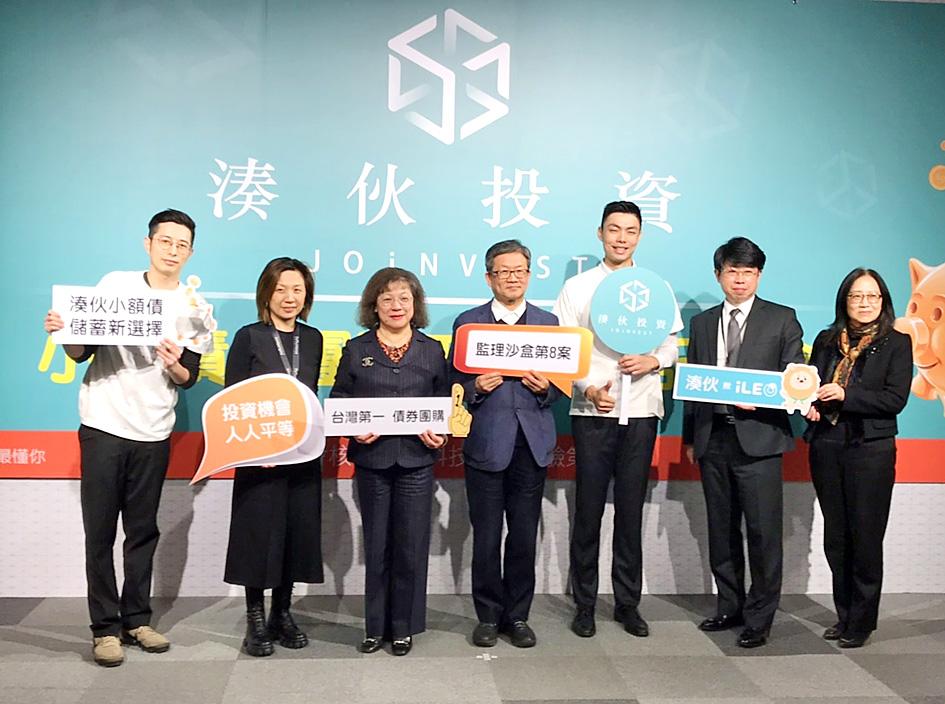Joinvest Co Ltd (湊伙) yesterday said it would launch a financial technology service next week that enables retail investors to buy foreign bonds via group buying with an entry threshold of just US$10, making investing in bonds accessible to those with limited budgets.
Joinvest’s new service was approved by the Financial Supervisory Commission (FSC) last month as a regulatory sandbox experiment lasting one year, with total investment limited to NT$200 million (US$7.02 million), company founder Lin Wei (林蔚) told a news conference in Taipei.
“Investment in foreign corporate bonds has many advantages, as it generates decent returns, and is safer than investing in stocks or funds. But it has a high threshold, as investors typically must order a minimum of US$10,000,” Lin said.

Photo: CNA
As the US$10,000 threshold has made it difficult for small investors to tap the market, Joinvest decided to provide a fintech service that helps investors connect with each other so that they can buy foreign bonds via collective buying, he said.
Joinvest has selected secondary market bonds issued by Warner Media LLC, Air Lease Co, National Australia Bank Ltd and Walt Disney Co, which have yields of 1.3 to 3.7 percent and mature in 2027 to 2032, Lin said.
They are all investment-grade bonds, with ratings of “A-minus,” as Joinvest aims to provide safe targets for retail investors, Lin said, adding that only 0.1 percent of bonds with ratings of A-minus have defaulted over the past 20 years.
The platform would allow people to choose which bonds to invest in and the amount to invest, and when enough investors chose a bond, Joinvest would finish the deal via foreign brokerages, using a trust account that it has set up at First Commercial Bank (第一銀行), Lin said.
To provide investors with liquidity, Joinvest would allow investors to sell their position to other investors on the platform before the bonds mature, he said.
“Investing in foreign bonds could be a better alternative than fixed deposits, as the interest rates of fixed deposits at local banks are too low,” Lin said.
The service would be the world’s first legitimate service that allows investors to buy a financial target via group buying, he said.
Joinvest would also look for qualified local bonds, but given low local interest rates, few corporate bonds have good yield rates, Lin said.
Each investor can invest a maximum of NT$250,000 on the platform, as Joinvest is required by the FSC to register at least 500 investors and finish three bond deals within one year, Lin said.
Joinvest is a Taipei-based start-up that began operation in May 2018, with paid-in capital of NT$4 million, but, to comply with an FSC request, the firm plans to raise money so that it can boost its paid-in capital to NT$14 million by the end of this year, he said.

Taiwan’s long-term economic competitiveness will hinge not only on national champions like Taiwan Semiconductor Manufacturing Co. (TSMC, 台積電) but also on the widespread adoption of artificial intelligence (AI) and other emerging technologies, a US-based scholar has said. At a lecture in Taipei on Tuesday, Jeffrey Ding, assistant professor of political science at the George Washington University and author of "Technology and the Rise of Great Powers," argued that historical experience shows that general-purpose technologies (GPTs) — such as electricity, computers and now AI — shape long-term economic advantages through their diffusion across the broader economy. "What really matters is not who pioneers

In a high-security Shenzhen laboratory, Chinese scientists have built what Washington has spent years trying to prevent: a prototype of a machine capable of producing the cutting-edge semiconductor chips that power artificial intelligence (AI), smartphones and weapons central to Western military dominance, Reuters has learned. Completed early this year and undergoing testing, the prototype fills nearly an entire factory floor. It was built by a team of former engineers from Dutch semiconductor giant ASML who reverse-engineered the company’s extreme ultraviolet lithography (EUV) machines, according to two people with knowledge of the project. EUV machines sit at the heart of a technological Cold

TAIWAN VALUE CHAIN: Foxtron is to fully own Luxgen following the transaction and it plans to launch a new electric model, the Foxtron Bria, in Taiwan next year Yulon Motor Co (裕隆汽車) yesterday said that its board of directors approved the disposal of its electric vehicle (EV) unit, Luxgen Motor Co (納智捷汽車), to Foxtron Vehicle Technologies Co (鴻華先進) for NT$787.6 million (US$24.98 million). Foxtron, a half-half joint venture between Yulon affiliate Hua-Chuang Automobile Information Technical Center Co (華創車電) and Hon Hai Precision Industry Co (鴻海精密), expects to wrap up the deal in the first quarter of next year. Foxtron would fully own Luxgen following the transaction, including five car distributing companies, outlets and all employees. The deal is subject to the approval of the Fair Trade Commission, Foxtron said. “Foxtron will be

INFLATION CONSIDERATION: The BOJ governor said that it would ‘keep making appropriate decisions’ and would adjust depending on the economy and prices The Bank of Japan (BOJ) yesterday raised its benchmark interest rate to the highest in 30 years and said more increases are in the pipeline if conditions allow, in a sign of growing conviction that it can attain the stable inflation target it has pursued for more than a decade. Bank of Japan Governor Kazuo Ueda’s policy board increased the rate by 0.2 percentage points to 0.75 percent, in a unanimous decision, the bank said in a statement. The central bank cited the rising likelihood of its economic outlook being realized. The rate change was expected by all 50 economists surveyed by Bloomberg. The